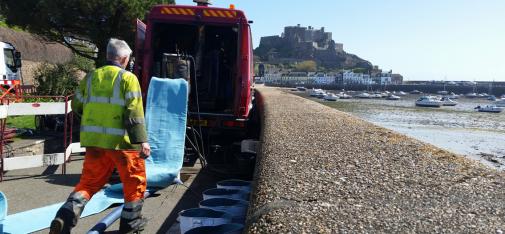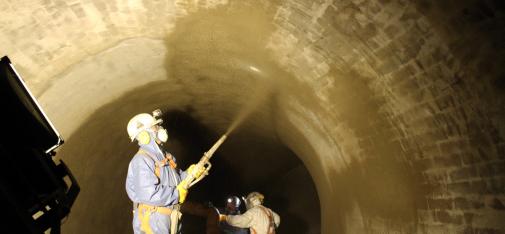-

Permanently flexible CIPP liner bonding system
Konudur Flexfit receives DIBt General Technical Approval
Konudur Flexfit, the special-purpose two-component reactive resin for CIPP liner bonding from MC-Bauchemie, including the cartridge variant Konudur Flexfit CS with the same formulation, were generally approved for construction use at the end of February 2021. In the course of the DIBt (German Institute of Building Technology) approval tests, both products were found to be eminently suitable for practical sewerage application.
Konudur Flexfit receives DIBt General Technical Approval
May 11, 2021
Konudur Flexfit, the special-purpose two-component reactive resin for CIPP liner bonding from MC-Bauchemie, including the cartridge variant Konudur Flexfit CS with the same formulation, were generally approved for construction use at the end of February 2021. In the course of the DIBt (German Institute of Building Technology) approval tests, both products were found to be eminently suitable for practical sewerage application.

© MC-Bauchemie 2025
Konudur Flexfit impresses in providing a permanently flexible connection between cured-in-place pipe (CIPP) liners and sewer manholes, offering easy workability, high moisture tolerance during application and very fast resilience to water exposure. Under normal sewerage system temperatures, Konudur Flexfit becomes water-resistant after just 25 to 30 minutes.
The significant time savings made possible by this property reduce overall costs thanks in particular to minimised traffic disruption and drainage times. The cartridge version, Konudur Flexfit CS, can be applied directly on site with the MC-Fastpack Power-Tool, a manually controlled, pneumatically driven 2-component applicator. This avoids the need for separate mixing and also facilitates work in tight spaces and under difficult operating conditions. The cured filler resin offers exceptional chemical resistance and mechanical resilience yet remains permanently flexible, ensuring effective compensation for changes in liner length due to shrinkage or temperature changes. Having been deliberately developed without an epoxy resin base, MC’s Konudur Flexfit filler also scores high in relation to occupational health and safety, with the generally ever-growing problem of allergic reactions suffered by rehabilitation operatives being reliably avoided.
Practical testing with accompanying material analysis
The practical test for the DIBt approval procedure involved the rehabilitation of two liner connections, conducted in strict compliance with coronavirus protection rules, which took place in the German city of Braunschweig on 26 October 2020. The municipal client, Stadtentwässerung Braunschweig GmbH, had kindly agreed to a liner connection being implemented with Konudur Flexfit in what was then designated as a field test construction site. The work was particularly difficult due to adverse weather conditions with continuous rain and cool temperatures of around 10 °C. Specialist applicators from Rainer Kiel Kanalsanierung GmbH (Blomberg branch, Germany) were commissioned to carry out the work. The accompanying material analysis for the DIBt approval was performed by the testing institute SBKS of St. Wendel, Germany.
During the practical test procedure, the concrete manhole of a rainwater sewer had to be hooked up to the sewer pipe at a depth of about two metres. The manhole’s lower shaft section had been reprofiled in advance using mineral based mortars, with the GRP CIPP liners being installed in the integrally connected DN 250 concrete pipes. Contractor Rainer Kiel Kanalsanierung performed the work in strict compliance with the instructions and specifications of the MC application manual, which describes each individual step of the process in clear detail. This firstly involved carefully preparing the substrate. The liners were stripped of their protective film and roughened with angle grinders, and the adjacent concrete and mortar surfaces were prepared with a needle gun. Particular attention was paid to the creation of bonding grooves for the resin in order both to create filler application space and to ensure a reliable keyed joint effect capable of withstanding even the toughest operating conditions.
Similar to the situation in a permanently flowing wastewater or combined sewer, the accumulating water resulting from the rainy conditions was held back by means of a shut-off bladder. However, the incessant and virtually uncontrollable rainwater inflow via the open manhole cover resulting from the terrible weather posed a major challenge for the connection work. Time and again, a continuous film of water formed on the substrate, which meant that matt-moist conditions could only be created by repeated blowing with compressed air and drying with cloths.
Despite these adverse working conditions, all parties involved decided to carry on and subject the Konudur Flexfit system to this unscheduled endurance test, the parameters of which were way beyond those normally deemed acceptable. And the system came through with flying colours! The material was compacted and overworked several times during application and the water was successfully displaced. Despite the cold weather, the applied Konudur Flexfit was ready for exposure to the water load just 30 minutes after the end of the application work. However, the water retention system remained in place for the subsequent renewal of the crampons.
On 5 November 2020, less than 14 days after application, the CIPP liner bond with Konudur Flexfit was subjected to another endurance test. Following the DIBt test procedure, the company Rohr-Fuxx Rohr- & Kanalreinigungs GmbH (Uetze branch, Germany) carried out multiple high-pressure flushes with a standard nozzle to simulate the kind of stress that would arise from sewer cleaning. During the subsequent leak test, performed in accordance with EN 1610, the inlets and outlets of the sewer section were shut off by means of bladders and the manhole shaft was then filled with fresh water. With a highly sensitive pressure sensor monitoring the change in water level, it was established that the liner bonds created with Konudur Flexfit had remained completely watertight. The testing institute SBKS oversaw this procedure and subsequently carried out the further laboratory approval tests.
Proof positive
The successfully completed laboratory and construction site test programme and the granting of General Technical Approval Z-42.3-578 serve to convincingly underline the fact that MC-Bauchemie’s Konudur Flexfit filler resins, including the cartridge variant Konudur Flexfit CS, can be relied upon to form a safe, permanent CIPP liner bond. In addition to providing approved attachments in manhole shafts, the resin family can also be used for the manual connection of lateral inlets in both manholes and accessible sewers, as well as for the filling and sealing of socket joints, even in the permanently flooded zone.
With such a positive outcome, senior engineer Sven Messmann, product manager for wastewater systems - sewage plants & underground sewer at MC-Bauchemie, singled out the contractors involved for a special word of praise: "Our thanks go to the companies who provided such support in carrying out the test site work under such difficult conditions – particularly in view of the coronavirus restrictions that were necessarily imposed.”
Your contact:
Sven Meßmann, Product Manager Wastewater Systems – Sewage Plants & Underground Sewer
Related Products
RELATED CONTENT
-
News
Click here to go to our News section.
-
MC-Pedia
In our MC-Pedia you will find technical articles on various topics written exclusively by our specialists.
-
Magazine
Get our latest issues of our customer and employee magazine MC aktiv.
-
Downloads
Find all relevant datasheets of our products as well as brochures of our company, Fields of Expertise and product categories here.
-
References
Click here to get to our library with reference projects for all types of application.
-
Careers
Click here to go to MC Career.
-
Contact
Click here to go to our Contact section.






